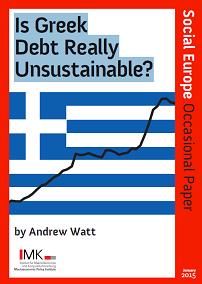Watt, A. (2015) “Is Greek Public Debt Unsustainable? It’s The (nominal growth rate of the) Economy, Stupid!“, Social Europe Journal, Occasional Papers No. 6, January. Greece will go to the polls on January 25th and everybody from German conservatives to Greek leftists seems to agree: Greek public debt is unsustainable. A haircut on investors and some form of partial default – more politely known as debt restructuring – is …Read More
Debt relief for Greece is necessary to avoid a crisis in the Eurozone
De Grauwe, Ρ. (2015) “Debt relief for Greece is necessary to avoid a crisis in the Eurozone“, LSE EUROPP, 12 January. On 25 January Greece will hold parliamentary elections. The elections have generated uncertainty in the Eurozone given the potential for the radical left party Syriza, which has called for a renegotiation of the country’s bailout conditions, to emerge as the largest party. Paul De Grauwe writes that even …Read More
The impact of fiscal austerity on suicide: On the empirics of a modern Greek tragedy
Antonakakis, N. & Collins, A. (2015) “The impact of fiscal austerity on suicide: On the empirics of a modern Greek tragedy“, Social Science and Medicine Journal, Volume 112, July 2014, pp. 39-50. Highlights We examine the effects of fiscal austerity on suicide in Greece over the period 1968–2011. The effects of fiscal austerity and economic growth are gender- and age-specific. Fiscal austerity affects only the male population, …Read More
The Greek Election 2015 – Revolt Of The Debtors
De Grauwe, P. (2015) “The Greek Election 2015 – Revolt Of The Debtors“, Social Europe Journal, 05 January. The Greek debt crisis that erupted in 2010 is back and again threatens the stability of the Eurozone. That crisis was the result of two factors. First, an unbridled spending drift of both the private and the public sectors in Greece during the boom years of 2000-2010, which led to unsustainable …Read More
Uncertain Silver Linings
Mendelsohn, J. (2015) “Uncertain Silver Linings, The European Magazine, Why Greece Should Not Leave the Euro Column, 07 January. Unlike other European politicians, Alexis Tspiras may not be making empty promises. He may actually present a chance for real change. Radical change. In light of the Greek elections and a possible Syrizian win, Europe, and Europe’s North in particular, has a lot to fear. Let’s not kid ourselves, Tspiras …Read More
Why Grexit would not help Greece – debunking the myth of exports
Wolff, Β. G. (2015) “Why Grexit would not help Greece – debunking the myth of exports“, Bruegel Institute, 06 January. The genie is out of the bottle: Europe is again discussing the possibility of Greece leaving the euro. With it, the debate has re-emerged whether this would be helpful or not for Greece and whether there would be contagion to other euro area countries. A big question is, of …Read More
Greece – two alternative views
Mitchell, B. (2014) “Greece – two alternative views“, Bill Mitchell Blog, Modern Monetary Theory… Macroeconomic Reality, 24 December. When I was in Europe recently, I had interesting discussions about the future of Italy, Greece and Spain with various people, particularly in relation to trying to understand the apparent dissonance between the strong support for the euro and the devastation that membership of the common currency has created in these …Read More
Greece election: opposition party’s main enemy will be time
Mason, P. (2014) “Greece election: opposition party’s main enemy will be time“, Channel 4 News, 21 December. There’s a quiz doing the rounds on Facebook about Greece’s radical left opposition party Syriza, called “Are You Syriza Enough?”. The last question is: “Do you think Syriza will succeed as a government?”. The choice of answers are not flattering to the far left party’s prospects: No, No way, Haha No, or …Read More
Despite a looming political crisis, Greece is no longer the threat to the Eurozone that it was in 2012
Davison, R. (2014) “Despite a looming political crisis, Greece is no longer the threat to the Eurozone that it was in 2012“, LSE EUROPP, 22 December. The Greek parliament is due to hold a second round of voting on 23 December to elect the country’s next president, following an unsuccessful vote last week. Remy Davison writes that while the threat of a political crisis is very real, the situation …Read More
The Greek Turnaround: Mending the Fragility and at What Price
Panagiotarea, E. (2014) “The Greek Turnaround: Mending the Fragility and at What Price“, in: Europe – Surging Ahead, Panorama – Insights into Asian and European Affairs, 02/2014, σσ. 59-70, 19 December. Introduction Greek economic adjustment was never going to be an easy task. For one, the starting imbalances were grave, hidden from view by years of budgetary misreporting and rudimentary surveillance, while the country’s institutional capacity to undertake and …Read More









